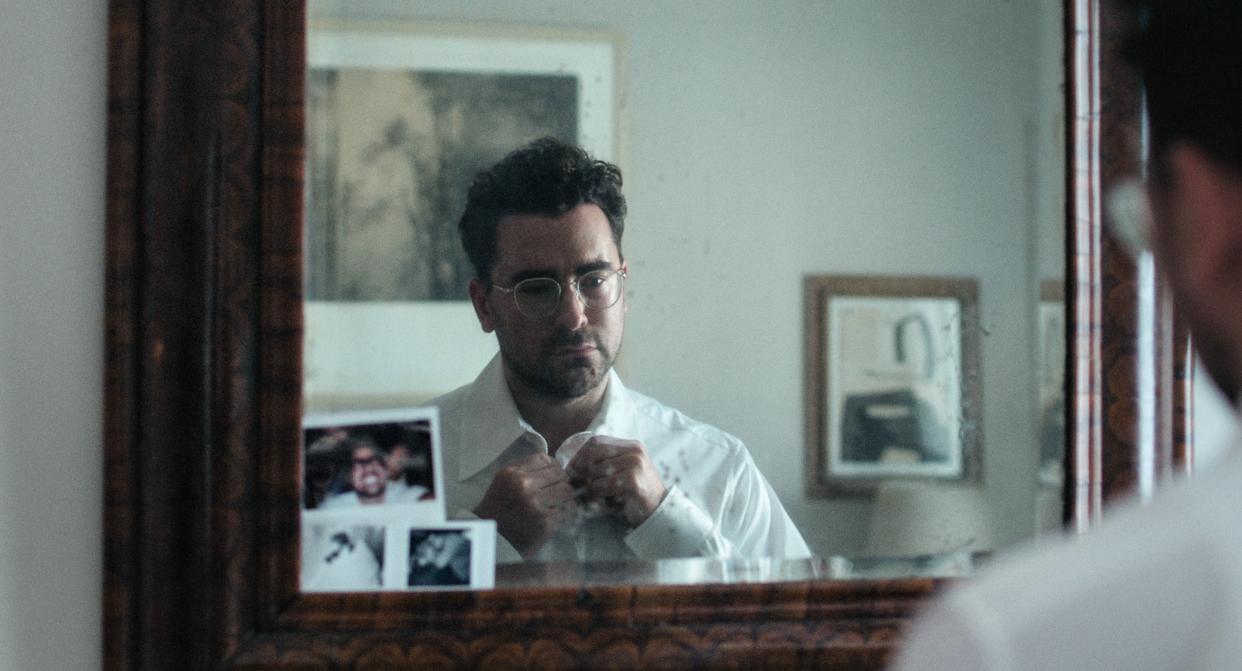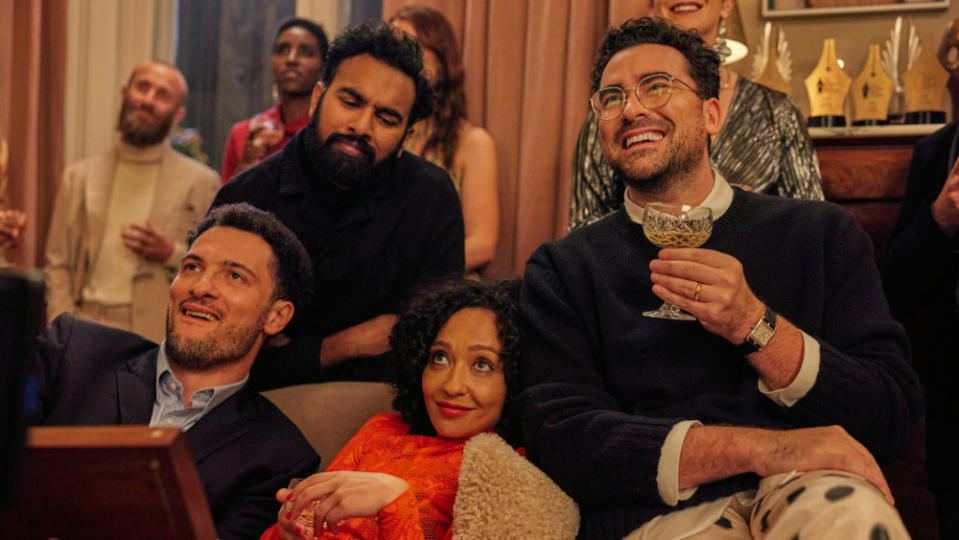‘Good Grief’ Review: Dan Levy’s Directorial Debut Is a Self-Absorbed Death Drama with Lots to Say and Little to Feel

A sensitive but almost fatally self-absorbed death drama that has much to say and little to feel, Dan Levy’s “Good Grief” is determined to convince you that life is better confronted than run from; in the plainspoken words of a character who brings the message home in the movie’s final minutes, “to avoid sadness is also to avoid love.” The moral is true, but the delivery feels unconvincing at the end of this movie, a story of private loss and shared friendship that reflects its protagonist’s struggle to integrate the two.
But if Levy’s Netflix film proves to be a strangely precocious debut for a 40-year-old success who already has a hit TV show to his name (Levy co-created “Schitt’s Creek” and steered the sitcom throughout its run), its broad and unrelentingly fabulous characters still manage — if only by accident — to convey something about grief that I had never really considered before: In a certain respect, it might be a lot harder for rich people.
More from IndieWire
For Golden Globe Winners, Just Reaching the Stage Was Often an Unwanted Odyssey
'Oppenheimer,' 'Succession,' 'The Bear,' 'Beef' Lead 2024 Golden Globes: Full Winners List
Rich people like Marc Dreyfus (Levy), a newly widowed American expat who has nothing to do but swan around the half-empty — but fully exquisite — London flat that his Adonis-like husband (Luke Evans) left to him after being killed in a car crash on Christmas Eve. It can’t be easy to lose someone that hot at such a young age, and it’s perfectly understandable that Marc responds to the tragedy by trying to avoid everything that reminds him of his late husband (work being at the top of the list, as Marc had sacrificed his artistic ambitions to draw the illustrations for Oliver’s wildly popular series of YA novels), but a year of low-intensity yoga classes and insufferable modern art shows only manages to cocoon him deeper inside his grief.
The only pressure Marc feels to move on with his life comes from the fact that his two best friends have problems of their own; their world can’t revolve around his sadness forever, but nothing is forcing him to move forward. And when Marc does finally sit down with Oliver’s lawyer (Celia Imrie) for a long-overdue conversation about money, the upshot isn’t that he has to make some.
You see, it turns out that Oliver — the most perfect man alive — had been hiding a big secret before he died. A secret that Marc would have learned a lot sooner had he found the strength to open the Christmas card that his late husband handed him just before getting into that fateful cab ride; a secret that, instead, is only brought to Marc’s attention when Oliver’s lawyer suggests that he sell the couple’s pied-à-terre in Paris.
Except, it wasn’t the couple’s pied-à-terre in Paris, but rather the one that Oliver had bought in order to rendezvous with the handsome young dancer he was swooning for on the side. This is what ultimately inspires Marc to confront the feelings that he’s been hiding from since Oliver’s death (and even before that in some ways), or at least what might have the power to do that if Marc can bring himself to admit the awful truth to his besties, life-of-the-party lonelyheart Sophie (an exuberant Ruth Negga, cooking in her natural accent) and the comparatively severe Thomas (the always-good Himesh Patel, constricted by scarves).
Why doesn’t Marc want to tell his closest pals the actual reason behind their impromptu Paris getaway? Why does he go through the hassle of pretending that he’s been to this apartment before? That he was the one having sex with Oliver on the loveseat in the living room? Sure, there’s the shame of being cheated on, and the embarrassment of an imperfect marriage (there are extenuating circumstances on both counts), but Marc seems more concerned that Sophie and Thomas have already exhausted their ability to prioritize his personal drama, and that this latest wrinkle might push them over the edge rather than engender the new sympathy that it demands.
That might sound like a selfless, if terribly sad, response to a devastating piece of news, but the way this secret displaces the other characters in this movie finds a real narcissism in the way that Marc continues to set the context for his pals. Such narcissism offers an honest reflection of the boundary-setting that tends to ossify and preserve some of our longest friendships, and Levy’s script — which only understands grief as an excuse to heighten every conversation into a matter of life or death — is never stronger and more lived-in than when it leverages the unique dynamics of queer relationships to explore how people can talk about everything without saying what really matters. Marc and Thomas are exes from a million years ago, and “Good Grief” peaks, figuratively and literally, as the two men unpack their past atop a massive ferris wheel.
It’s an unexpectedly high-stakes climax for a film whose previous dramatic questions include “will the haughty salesperson allow Marc to exchange an item that Oliver bought for his lover?,” “will Marc summon the courage to text the dashing and sexually available Frenchman who shares his apparent fetish for inauthentic movie banter?,” and “will Levy find another candied piece of Swede-pop to complement Annie and Robyn on a soundtrack that feels like it was mixed by a sad and starry-eyed NYU student in the fall of 2006?” (answer key: yes, yes, and no, but he pulls out a Bonnie Raitt deep-cut instead).
More than anything, that heart-to-heart with Thomas is an overdue chance for “Good Grief” to confront Marc’s self-centeredness, which often seems more powerful and odious than Levy may have intended. The bereaved protagonist’s egocentricity proves inescapable even as the movie around him strains to insist that it’s less about death than friendship — less about what’s been lost than what remains to be found or rediscovered.

This sweet and shimmering trifle mistakes Marc’s semi-charmed kind of life for something that will be inherently semi-charming for us to enjoy secondhand, but the general fabulousness of his existence doesn’t provide a meaningful contrast to his pain so much as it exposes the poverty of his pleasure. Levy winces through every line with a cocked head and a broken heart (all of the dialogue is cutting, almost none of it bleeds), and the privilege of Marc’s wealth affords him a case of main character syndrome that seems more like a curse with every passing scene.
“At what point in the grieving process do I have to stop making everything about me?” would be a more compelling question in a movie where anybody seemed interested in the answer. Levy certainly asks that question with aplomb; Oliver’s dad, played by “Harry Potter” actor David Bradley, delivers a heartbreakingly beautiful eulogy in which he reflects on his missteps in raising a gay son, but Levy dilutes it with so many wet-eyed reaction shots of Marc in the audience that you can already tell that he isn’t really listening. (Strangely enough, the funeral sequence also sets the stage for a jarring bit of “Schitt’s Creek”-like comedy that almost feels like fan service in a film so intent on establishing Levy’s dramatic bonafides.)
Everything is in the service of Marc’s luxurious sadness, up to and including Oliver’s entire life, and it becomes increasingly difficult to invest in Sophie and Thomas’ own problems or accept them at face value when the movie keeps insisting that they should only matter to us so far as they matter to Marc. A better film might have done more to engage with the protective narcissism of mourning, and the difficult process of allowing that shell to crack open.
“Good Grief,” however, aspires to be a New Year’s classic — to have the wistful coziness of “Auld Lang Syne” — and so the only catharsis it finds is in Marc’s realization that he has to put himself first, even when that hurts. Purpose doesn’t rescue him from his grief so much as grief returns him back to his purpose. If only all of our lives could be so rich.
Grade: C
“Good Grief” is now streaming on Netflix.
Best of IndieWire
Sign up for Indiewire's Newsletter. For the latest news, follow us on Facebook, Twitter, and Instagram.

